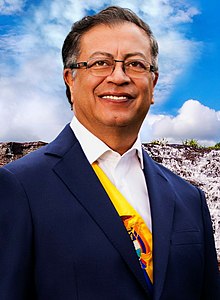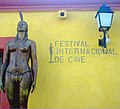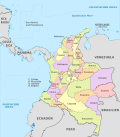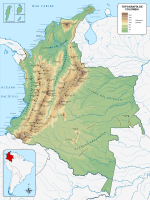Portal:Colombia
Colombia articles: History | Politics | Geography | Provinces | Economy | People | Culture | Café de Colombia | and much more...
The Colombia Portal
Colombia, officially the Republic of Colombia, is a country primarily located in South America with insular regions in North America. The Colombian mainland is bordered by the Caribbean Sea to the north, Venezuela to the east and northeast, Brazil to the southeast, Ecuador and Peru to the south and southwest, the Pacific Ocean to the west, and Panama to the northwest. Colombia is divided into 32 departments. The Capital District of Bogotá is also the country's largest city hosting the main financial and cultural hub. Other major urbes include Medellín, Cali, Barranquilla, Cartagena, Santa Marta, Cúcuta, Ibagué, Villavicencio and Bucaramanga. It covers an area of 1,141,748 square kilometers (440,831 sq mi) and has a population of around 52 million. Its rich cultural heritage—including language, religion, cuisine, and art—reflects its history as a colony, fusing cultural elements brought by immigration from Europe and the Middle East, with those brought by the African diaspora, as well as with those of the various Indigenous civilizations that predate colonization. Spanish is the official language, although Creole, English and 64 other languages are recognized regionally. Colombia has been home to many indigenous peoples and cultures since at least 12,000 BCE. The Spanish first landed in La Guajira in 1499, and by the mid-16th century, they had colonized much of present-day Colombia, and established the New Kingdom of Granada, with Santa Fé de Bogotá as its capital. Independence from the Spanish Empire was achieved in 1819, with what is now Colombia emerging as the United Provinces of New Granada. The new polity experimented with federalism as the Granadine Confederation (1858) and then the United States of Colombia (1863), before becoming a republic—the current Republic of Colombia—in 1886. With the backing of the United States and France, Panama seceded from Colombia in 1903, resulting in Colombia's present borders. Beginning in the 1960s, the country has suffered from an asymmetric low-intensity armed conflict and political violence, both of which escalated in the 1990s. Since 2005, there has been significant improvement in security, stability, and rule of law, as well as unprecedented economic growth and development. Colombia is recognized for its healthcare system, being the best healthcare in Latin America according to the World Health Organization and 22nd in the world. Its diversified economy is the third-largest in South America, with macroeconomic stability and favorable long-term growth prospects. Colombia is one of the world's seventeen megadiverse countries; it has the highest level of biodiversity per square mile in the world and the second-highest level overall. Its territory encompasses Amazon rainforest, highlands, grasslands and deserts. It is the only country in South America with coastlines (and islands) along both the Atlantic and Pacific oceans. Colombia is a key member of major global and regional organizations including the UN, the WTO, the OECD, the OAS, the Pacific Alliance and the Andean Community; it is also a NATO Global Partner and a major non-NATO ally of the United States. (Full article...) Selected article -Bogotá (/ˌboʊɡəˈtɑː/, also UK: /ˌbɒɡ-/, US: /ˈboʊɡətɑː/, Spanish pronunciation: [boɣoˈta] ⓘ), officially Bogotá, Distrito Capital, abbreviated Bogotá, D.C., and formerly known as Santa Fe de Bogotá (Spanish: [ˌsanta ˈfe ðe βoɣoˈta]; lit. 'Holy Faith of Bogotá') during the Spanish Colonial period and between 1991 and 2000, is the capital and largest city of Colombia, and one of the largest cities in the world. The city is administered as the Capital District, as well as the capital of, though not part of, the surrounding department of Cundinamarca. Bogotá is a territorial entity of the first order, with the same administrative status as the departments of Colombia. It is the main political, economic, administrative, industrial, cultural, airport, technological, scientific, healthcare and educational center of the country and northern South America. Bogotá was founded as the capital of the New Kingdom of Granada on 6 August 1538 by Spanish conquistador Gonzalo Jiménez de Quesada after a harsh expedition into the Andes conquering the Muisca, the indigenous inhabitants of the Altiplano. Santafé (its name after 1540) became the seat of the government of the Spanish Royal Audiencia of the New Kingdom of Granada (created in 1550), and then after 1717 it was the capital of the Viceroyalty of New Granada. After the Battle of Boyacá on 7 August 1819, Bogotá became the capital of the independent nation of Gran Colombia. It was Simón Bolívar who rebaptized the city with the name of Bogotá, as a way of honoring the Muisca people and as an emancipation act towards the Spanish crown. Hence, since the Viceroyalty of New Granada's independence from the Spanish Empire and during the formation of present-day Colombia, Bogotá has remained the capital of this territory. (Full article...)Related portalsCategoriesSelected biography -Gustavo Francisco Petro Urrego ODB ODSC ODIC (Spanish pronunciation: [ɡusˈtaβo fɾanˈsisko ˈpetɾo wˈreɣo]; born 19 April 1960) is a Colombian politician and economist who has been serving as the 34th and current president of Colombia since 2022. A member of the M19 armed guerrilla movement, upon inauguration, he became the first left-wing president in the recent history of Colombia. At 17 years of age, Petro became a member of the guerrilla group 19th of April Movement, which later evolved into the M-19 Democratic Alliance, a political party in which he was elected to be a member of the Chamber of Representatives in the 1991 Colombian parliamentary election. He served as a senator as a member of the Alternative Democratic Pole (PDA) party following the 2006 Colombian parliamentary election with the second-largest vote. In 2009, he resigned his position to run in the 2010 Colombian presidential election, finishing fourth in the race. (Full article...)Did you know (auto-generated)
General imagesThe following are images from various Colombia-related articles on Wikipedia.
Selected pictureLargest cities
TopicsNew articlesThis list was generated from these rules. Questions and feedback are always welcome! The search is being run daily with the most recent ~14 days of results. Note: Some articles may not be relevant to this project.
Rules | Match log | Results page (for watching) | Last updated: 2024-05-09 20:17 (UTC) Note: The list display can now be customized by each user. See List display personalization for details.
WikiprojectsThings you can doIf you are interested in helping with this portal, please join WikiProject Colombia or one of its child projects: Article requests
History (High priority)
Society
Scouting
People (Medium priority)Physical geography
Media (Medium Priority)Government and political affairs (High priority)
Wikipedia's portalsDiscover Wikipedia using portals Sources | |||||||||||||||||||||||||||||||||||||||||||||||||||||||||||||||||||||||||||||||||||||||||||||||||||||||||||||||






































![Image 2Tall ship ARC Gloria, insignia of Colombia. She is a training ship and official flagship of the Colombian Navy.[1]](http://upload.wikimedia.org/wikipedia/commons/thumb/e/eb/ARC_Gloria_by_Will_White.png/120px-ARC_Gloria_by_Will_White.png)
























